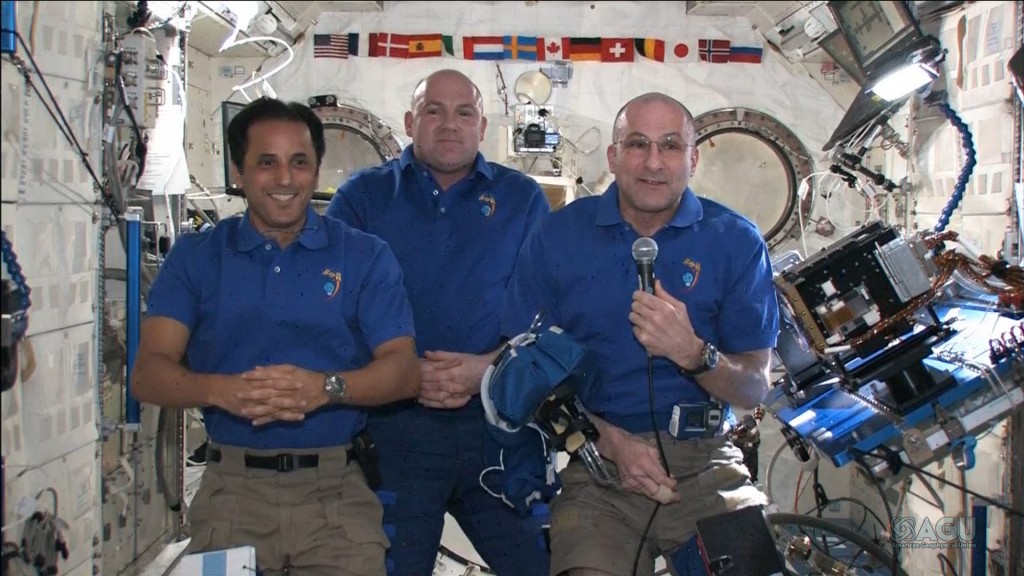21 June 2012
AGU interviews astronauts in space
Posted by mcadams
On 19 June, AGU had the extraordinary opportunity to interview three of the astronauts aboard the International Space Station about what it’s like to observe the Earth from space. The three scientists spoke about their everyday lives in orbit, the hazards of life in space and how their experiences in microgravity have affected their thoughts about our home planet.
[youtube=http://youtu.be/uHsmDqZEuQU]
AGU Interview with Expedition 31 on the International Space Station
“Your last day on Earth; What would you do?” NASA astronaut Don Pettit mused recently in a poem on his blog, Letters to Earth, referencing the day before he launched to the ISS about six months ago. It’s a question anyone could answer, but when quizzed by AGU as he nears his last day on the station, Pettit said he was pondering a new question – “Your last day in space; What would you do?” He is still forming his answer, but in the meantime, he and two of his ISS colleagues had a lot to say about the time in between.
“Every time when I look out of the window, it looks like the first time,” said European Space Agency astronaut André Kuipers. “Every time, it’s so magnificent that I think, ‘This is awesome!’”
Born in Amsterdam, The Netherlands, Kuipers is a medical doctor who did research before he became an astronaut on how spatial disorientation and microgravity affect pilots. Kuipers passed up the opportunity to do clinical research, something he was eager to do, on the hope that he might be selected as an astronaut. The risk paid off when he joined the European Astronaut Corps in 1999. During the current mission — Expedition 31, Kuipers experimented on how microgravity affects humans over the long term.
In fact, all of the astronauts took part in the biological experiments, which included Kuipers taking a blood sample from his colleague, Joe Acaba, the other NASA astronaut currently aboard the station.
“I don’t do well with blood,” Acaba admitted on his blog, The Great Outer Space, while also praising Kuipers’ work. Acaba, who arrived at the station on 17 May, started his career as a geologist, ultimately shifting to middle- and high-school science and math teaching before becoming an astronaut. Along the way, he studied groundwater contaminants as a hydrogeologist in Los Angeles, served in the Peace Corps, and taught others about the environment.
When asked what he pondered during his quiet moments on the station, Acaba said, “I envy those kids that are out there now for the adventures that they’re going to have in the future.”
As Acaba settles into his ISS mission, Kuipers and Pettit are getting ready to return to Earth on 1 July. Pettit, who became an astronaut in 1996, is approaching the end of his third flight in space. Before joining NASA’s astronaut corps, he conducted reduced-gravity experiments on NASA’s KC-135 airplane (the “Vomit Comet”) and studied gas samples from volcanoes, among other projects, as a staff scientist at Los Alamos National Laboratory in New Mexico.
So what does a man who has lived in orbit for a cumulative year think about during his last week in space? “You’ll just have to wait and see how it turns out. I don’t even know how it’s going to turn out!” Pettit said. You can watch the entire interview with astronauts Acaba, Kuipers, and Pettit, on YouTube.

International Space Station astronauts Joe Acaba (left, NASA), Andre Kuipers (ESA) and Don Pettit (NASA) answer questions about life in space during a live interview with the American Geophysical Union on 19 June.










 GeoSpace is a blog on Earth and space science, managed by AGU’s Public Information staff. The blog features posts by AGU writers and guest contributors on all sorts of relevant science topics, but with a focus on new research and geo and space sciences-related stories that are currently in the news.
GeoSpace is a blog on Earth and space science, managed by AGU’s Public Information staff. The blog features posts by AGU writers and guest contributors on all sorts of relevant science topics, but with a focus on new research and geo and space sciences-related stories that are currently in the news.